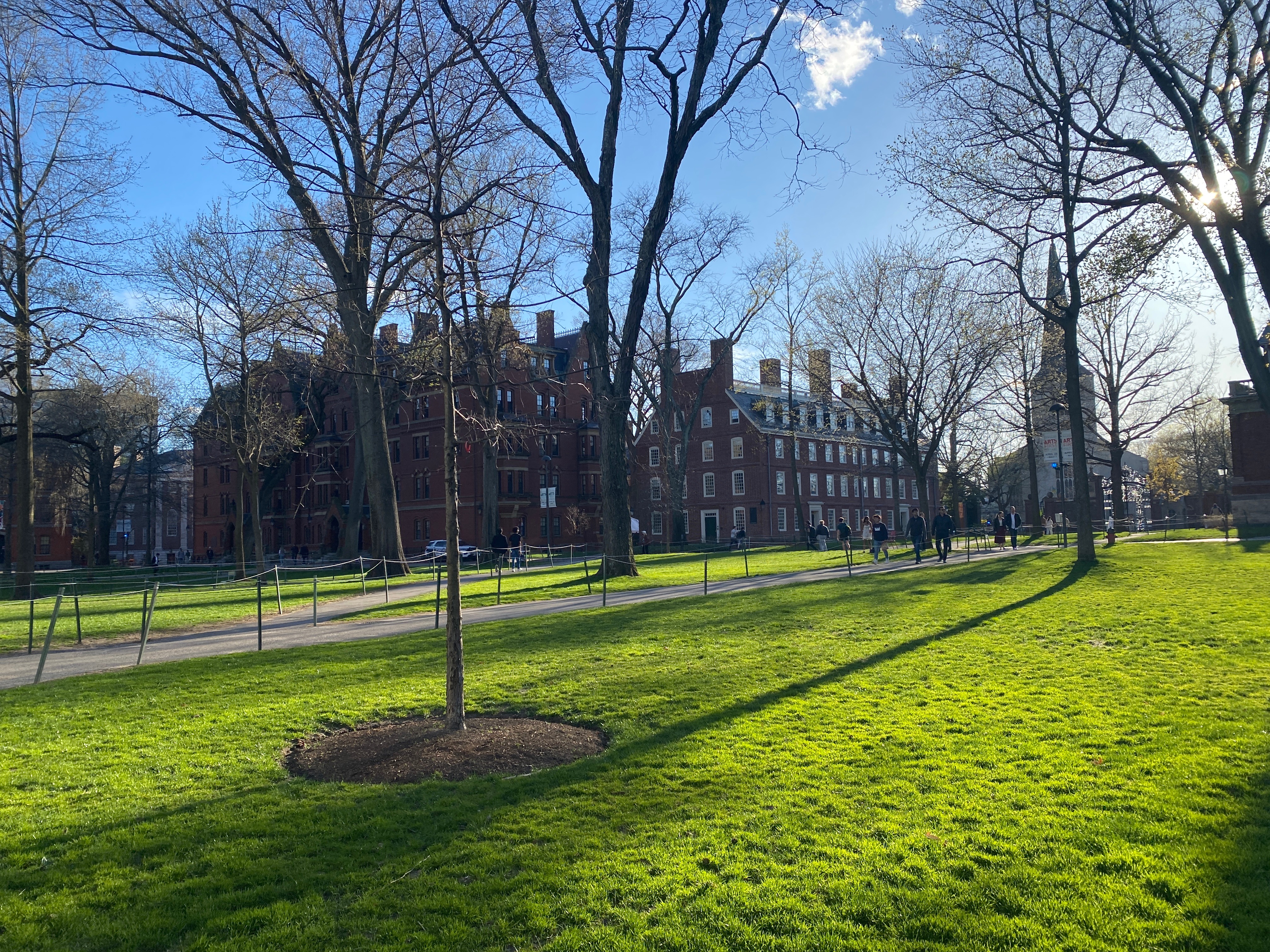I was Drunk at Harvard
Published:
I’m a member of an institute which seeks to push the boundaries of theoretical physics and AI research. In other words, we are a bunch of physicists doing research in AI, or a bunch of physicists doing research in physics using AI. At the current state of the AI apocalypse in 2023, the line is quite blurry between the two. Harvard University is a member of this institute. It’s quite fun.
Every so often there are social events that pull us physicists away from our poorly lit offices and Hagoromo chalk. One such event was (you guessed it) at Harvard, in the lawn outside their physics department circa end of Summer 2022, after a conference at Tufts. The grass was green and the trees were providing ample shade; there were tents and beer and pizza and some of the most brilliant physicists and AI researchers in the world, together, eating pizza and drinking beer.
Of course, after a while, I was drunk at Harvard. I was drunk at Harvard around my PhD advisor. Hell, my PhD advisor was also drunk! Now, I don’t particularly care that it was Harvard. Of course, it added to the ambiance. I was around some of what I consider to be the most brilliant people in the world, at the oldest and most well-funded university in the world that also historically fosters a toxic environment of elitism and entitlement, shamelessly skews admission to legacy students and those hailing from families who contribute to its ostentatiously large endowment, and is guilty of widespread grade-inflation to unethically predispose alumni for favorable positions in the job market after graduation.
Anyways, what this is about is the conversations I heard. Settings like this are when physicists, void of chalk and notebooks, can abandon some rigor and be forced to look at things in the big picture. When after a few drinks instead of slurring one’s words one is finally speaking freely and openly about the state of the field, somehow free of their fought-for titles and funding and openly wondering about the significance of their own work in the grand scheme of science. Such is being drunk at Harvard.
At a table of string theorists, I heard them compare life-notes on what they would do if their pot of gold (that is, string theory being the correct theory of quantum gravity) didn’t end up existing at the end of the rainbow. One laughed (seemingly) maniacally at the prospect of their entire life’s work being thrown out due to a hypothetical experiment disproving string theory. Another calmly said he would be fine continuing to study algebraic geometry in a pure math context. And another proudly said, “…if we’re not right, I have faith that we certainly helped get closer to the truth!” This part resonated with me; many (including myself) can forget that scientific research, despite all its rigor and jargon, is propelled by faith. They were (happy) drunk at Harvard.
Around a conversation of experimental particle physicists, they were discussing the so-called “promises of tomorrow” that aren’t necessarily promises. The US was slated to be a leader in experimental particle physics with the advent of the Superconducting Super Collider that was eventually struck down by Congress. The glory of finding the Higgs Boson was left to CERN and the Swiss. People whose PhD research or even entire careers rely on experiments getting funded and/or refunded, while seemingly a guarantee from the perspective of a very biased and naive PhD student, is by no means a given. “They [the students] think: well, of course REDACTED will get refunded. Why wouldn’t it be? What they don’t know is the conversations I’m in, in trying to convince the committees I’m in. I have to argue why it should be. It’s by no means one-sided.” They were (stressed) drunk at Harvard.
At a table of theoretical AI researchers, they were debating deep double-descent and grokking. These are technical terms for phenomena observed in neural networks, where they seemingly suck and are either 1) memorizing what they’re training on or 2) not learning anything, and then as if they were somehow sentient…they suddenly learn meaningful things. I couldn’t write down any quotes from this one because I was too mesmerized. The dominating opinion was that despite all of our mathematical prowess, we somehow still fail to understand basic statistics, and we just don’t know why. That’s right – some of the most brilliant scientists on Earth admit to not understanding basic statistics. They were (confused) drunk at Harvard.
By this point, I couldn’t tell if the world was spinning from the triple IPAs my advisor convinced me to drink, or because of the sheer honesty I was witnessing in front of me. It is so, so easy to romanticize science; it is not often that I see it stripped down and hung out to dry, baring its open wounds. But this was important for me to see.
It struck me at a certain point that the most influential conversations in science likely happen in this exact setting. After a week of talks at a conference, many that are tired but incapable of talking about anything other than work use this as an opportunity to take a step back and evaluate the state of the field. Was Einstein ever drunk at Harvard?
A lot of influential ideas were probably shared. A lot of ones that probably didn’t work, too. All of this wisdom, emotion, and stress eventually manifests as funded grants and research projects, proposed to young undergrads keen on trying physics research, all the way up to the halls of Congress, where the most righteous of us vouch for and defend science and its many expenditures. The seeds for this were planted over some pizza and beer, under the trees on some random lawn that just so happened to be at Harvard.

